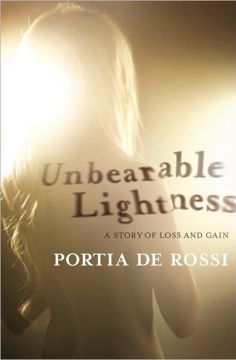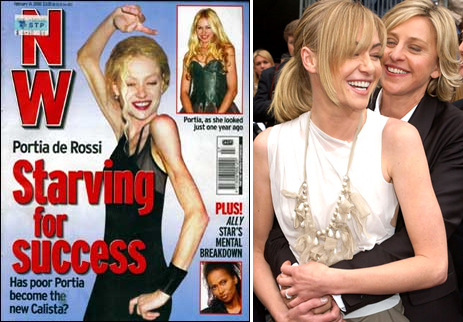 Portia de Rossi appeared on Oprah today for an hour long tell-all to promote her memoir, Unbearable Lightness. She took the viewer back to 1997 when Ally McBeal was the hottest show on TV and cracked open the behind-the-scenes anxiety surrounding her eating disorders (she was both anorexic and bulimic since her modeling career began in the early 90s) and hiding her sexuality. The most striking thing about Portia’s story is how universal it is to anyone who’s struggled with feeling ostracized or different or sick — even if you’re not gay or you’ve never had an eating disorder.
Portia de Rossi appeared on Oprah today for an hour long tell-all to promote her memoir, Unbearable Lightness. She took the viewer back to 1997 when Ally McBeal was the hottest show on TV and cracked open the behind-the-scenes anxiety surrounding her eating disorders (she was both anorexic and bulimic since her modeling career began in the early 90s) and hiding her sexuality. The most striking thing about Portia’s story is how universal it is to anyone who’s struggled with feeling ostracized or different or sick — even if you’re not gay or you’ve never had an eating disorder.
She realized she was gay at 18 after continually developing feelings for her girl friends:
“The thing that made me think I wasn’t [heterosexual] was I developed very strong feelings for my best friends, for my girl friends, that were stronger than friendship. And I had a series of mini-heartbreaks throughout my teens because my fantasy of what life could be like with my best friend wasn’t shared with my best friend. My best friend wanted to get married to a man and have kids and I just wanted to be with them. And that’s when I thought something was definitely different about me. So really it took until I was about 18 when I realized I have to date other lesbians if I was ever going to fulfill that fantasy.”
On dieting, she warns that perpetual dieting is a form of an eating disorder and something as simple as going on a “diet” can gradually spiral out of control and take over someone’s life. In addition to being anorexic and eating as little as 300 calories a day, Portia details binging and purging after work on her very first day of Ally McBeal. Although David E. Kelley never suggested the women in the cast (Calista Flockhart, Courtney Thorne-Smith) ought to be certain size, Portia looked around at her co-stars and felt that being extremely thin was a necessity.

Portia also takes Oprah back to when she was 15 and first changed her name from Amanda Lee Rogers to the most exotic sounding thing she could think of — “Portia de Rossi.” She was inspired to change her name while competing against a fellow runner with the exact same birth name and set out to “make a name for herself” separate from anyone (including her family). Looking back on life, Portia identifies the name change as the first indicator of not being OK with who she really was. This story is later book-ended when she describes yearning for a sense of family and belonging, her reason for taking Ellen‘s last name. In a twist, Portia actually met Ellen in 2003 when she was at her heaviest – 168 pounds – and takes comfort in knowing Ellen is attracted to her no matter her weight.
.
Although her story begins when she is a teenager in Australia, it’s quickly brought to the present when she theorizes if every gay person came out, no matter their profession – actor, teacher or doctor – the recent suicides would not be happening.
 The most insightful and universal truth comes in the final moment of the interview, when Portia speaks of her mother’s acceptance, shrouded in homophobia:
The most insightful and universal truth comes in the final moment of the interview, when Portia speaks of her mother’s acceptance, shrouded in homophobia:
“She didn’t really know how devastating it is for a parent to say ‘I accept it, that’s the way it is and it’s fine but don’t tell anybody. It’s a strange message to send somebody. There’s a very fine line between being private and being ashamed.“








Comments
Shouldn’t it be “Portia DeGeneres appeared on Oprah”? ;)
Thanks for the write up, I was disappointed I missed it.
I don’t know if I’ve ever heard a famous person propose that everyone come out in order to ease homophobia and increase acceptance.
I’ve heard a lot of non-famous people say that; it’s cool to hear her saying the same thing. :-)
Didn’t get to watch the episode but am glad to hear that Portia was her usual classy, candid, well-spoken self.
I remember when she only had one foot out the closet door, kind of halfway openly dating Francesca Gregorini (what ever happened to her anyway?). So glad to see that she’s reached a positive place in her life and is opening up about such personal issues.
Yay Portia! Ellen’s a very lucky woman.
Also, I still keep my fingers crossed for some kind of Ally McBeal reunion, just so I can see Portia and Lucy Liu back in character again. Loved that duo.
meerrrr! portia and ellen always give me warm fuzzy feelings.
Me too. I’m pretty sure that I would watch a show that was just them cuddling on the couch and be very pissed off should I ever miss an episode. They just make you feel that good.
Oh man. I wanna watch that show. Let me know if we can start a petition or something to make this happen. :)
I’m reading it right now and it’s really interesting so far.
when I get paid I’m soo downloading this from iTunes!
Aww, I saw that episode while I was working out at the gym yesterday. It’s super interesting and I’m happy I got to watch it. (I never watch TV, but I just happened to notice the TV in front of me had Portia on it so I was fixated – she’s gorgeous!)
In part two, Oprah introduces a section of the book about her L’Oreal fitting by telling the audience that all women can relate to the experience of trying on clothes and hating yourself because they don’t fit. I am annoyed that even when eating disorders are the topic of the day, we have to reinforce the idea that it’s normal or expected for women to hate their bodies. It may be typical, but we shouldn’t be stating something as a fact when it’s a thing that needs to change and that women shouldn’t just think that’s part of being a woman. anyhow!
In other news portia is amazing and i love her.
Am I the only person who feels hatred towards the clothing company when I try on clothes that don’t fit? (And I’m not talking “why do I fit into the size 8 instead of the size 6” but “there is no way this garment could look flattering on/fit onto any human being as it’s been designed”…)
I don’t feel hatred particularly, but like — if clothes don’t fit you, the problem is actually with the clothes, not with your human body? I feel like people don’t understand this.
My standard is, if Sara Ramirez wouldn’t wear this/look good in it, why the fuck should I? It has saved my sanity like 19000 times while clothes shopping.
this is my favorite. i love that sara has boobs. because, you know, girls have them. clothing designers should see this
I watched the entire interview, and could only think about the irony involved in watching a woman talk to OPRAH about how difficult it is to be 1) a closeted lesbian and, 2) struggle with chronic dieting/eating disorders. I kept thinking “oh girll….(margaret cho voice)”
the whole thing was very meta, doncha think?
Portia and Ellen always give me warm fuzzy feelings like all is going to be alright with the world.
I’m planning on going to Borders to buy this after I go vote :)
I’m going to have to find this interview and then put this book on my ever-growing book list. :)
Speaking of Portia and Ellen, if you thought the Oprah interview was great apparently Portia will on the Ellen Show tomorrow to talk about her book!
I’m anticipating so much adorableness!
I just watched Portia’s interview on Ellen. When Ellen said “my wife, Portia,” I got lots of warm and fuzzy feelings. Also, Ellen normally kinda glows anyways, but she is radiant in this video as she announces Portia. <3
I used to be fat. Not fat like skinny girls who think they are fat when they are not. But actually fat. I know because before that I was thin. In high school I was the kind of person who was just “naturally” thin. I had horrible eating habits as a result – foods that are super bad for you and zero vegetables.
Then, I suppose, the hormones of puberty stopped and college began. I was no longer as active. I sat in lecture halls for hours, sat in the library, sat at home doing homeworky things. But my eating habits didn’t change so my body did.
I finally got my shit together and realized I’d need to eat right and exercise if I wanted to be healthy. Right now I am thinner than I have ever been, but I think more about my weight now than ever before and I can’t really understand why. Because I never really thought I was fat or felt a desire to be skinny. I just looked accross the dinner table and thought “I’m unhealthy and I have this wonderful person that I want to spend the rest of my life with and I’d kinda like that life to be as long as possible.”
I mean, it’s just a number. Everybody weighs something, I just happen to weigh this.
What I mean to say is…great review.